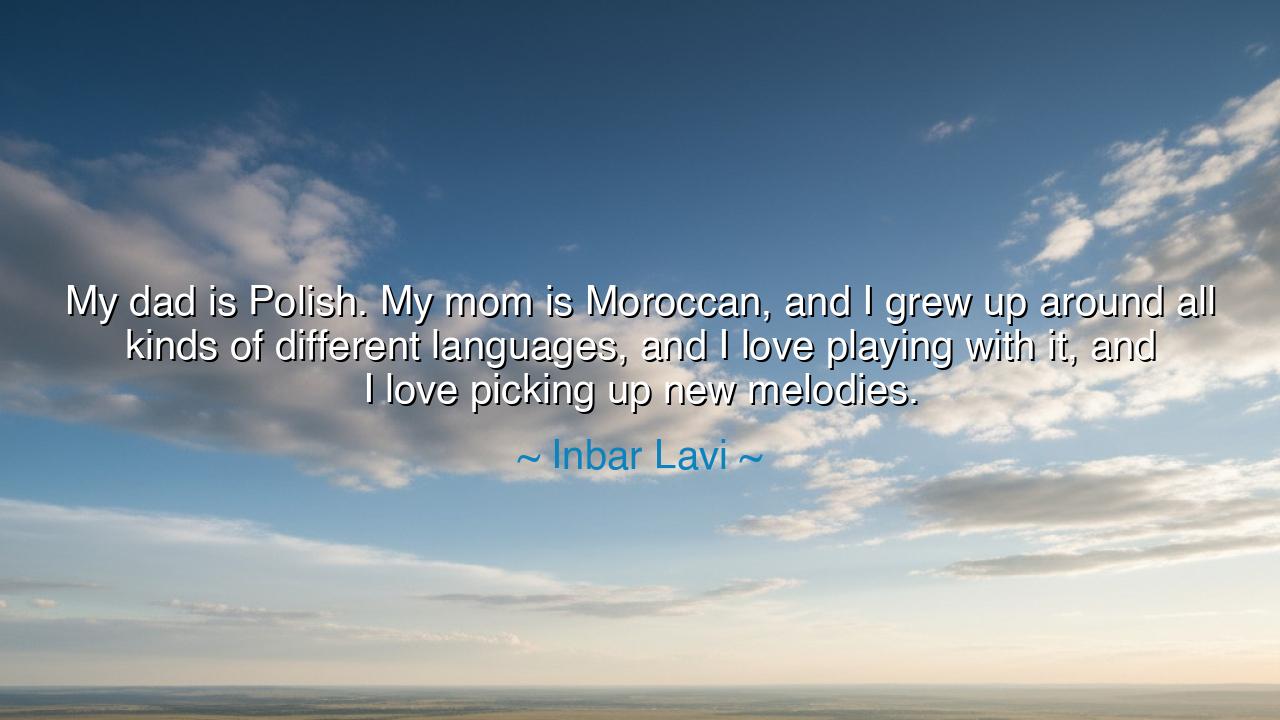
My dad is Polish. My mom is Moroccan, and I grew up around all
My dad is Polish. My mom is Moroccan, and I grew up around all kinds of different languages, and I love playing with it, and I love picking up new melodies.






In the words of Inbar Lavi, “My dad is Polish. My mom is Moroccan, and I grew up around all kinds of different languages, and I love playing with it, and I love picking up new melodies.” Within this simple reflection lies a truth both ancient and eternal — the beauty of diversity, the harmony born from difference, and the creative power that arises when cultures meet and intertwine. This is not merely a statement of ancestry; it is a celebration of identity as a symphony — many voices, many rhythms, woven into one living song. Inbar speaks not as one torn between worlds, but as one who has learned to dance between them, transforming contrast into creation, and heritage into art.
The origin of this quote flows from Lavi’s own life, a journey that began in Israel, born to a Polish father and a Moroccan mother, each carrying the traditions, music, and languages of their people. From her earliest days, her world was a mosaic — Polish lullabies mingling with Moroccan folk tales, Hebrew mingling with the soft cadence of other tongues. It was an upbringing of sound and color, of many melodies forming one harmony. In such a home, identity was not confined to one flag or language; it was fluid, alive, ever expanding. This upbringing became the foundation of her art — for to her, every word, every note, carries the possibility of connection.
There is a deep wisdom here — for the child of many worlds often becomes the bridge between them. Where others see division, such souls see music. They are translators of the heart, able to find beauty in every accent and rhythm. The ancient ones knew this truth well. In the marketplaces of old Babylon and the ports of Alexandria, merchants and poets from every land gathered, exchanging not only goods but words, stories, and songs. It was in those minglings of tongues that civilization itself grew wiser. So too, Inbar’s love for “different languages” and “new melodies” is not mere curiosity — it is participation in that great, ancient inheritance of human unity.
Her words, “I love playing with it,” carry a sacred innocence — the joy of creation that arises when one is unafraid to explore. To “play” with language and melody is to reclaim the spirit of the child — open, curious, and fearless. It is through such play that the artist discovers truth, for creativity is the art of listening deeply to the world. In every language, she finds a new melody; in every melody, a new way to express love, sorrow, and longing. Her art reminds us that to live fully, one must not build walls around identity, but open doors toward others.
Consider the story of Leonardo da Vinci, the man of many disciplines — painter, engineer, scientist, dreamer. He was not bound by one field, one culture, or one method. He studied the mechanics of birds and the movement of water, the proportions of man and the light of the heavens. Through this love of variety, he discovered unity. In the same way, Inbar Lavi’s blending of Polish, Moroccan, and global influences mirrors the Renaissance spirit — that the more one learns, the more one becomes whole. The world itself, after all, is one grand composition, and those who listen deeply enough can hear its universal melody.
Yet her reflection also reveals something more intimate: gratitude. To honor one’s heritage is to honor one’s roots, even as one grows beyond them. Her father’s European discipline, her mother’s North African warmth — these are not opposing forces, but complementary notes in the same song. Each gives her something vital: strength from one side, soul from the other. The languages she “picks up” are not just words — they are bridges across time and ancestry. She reminds us that every tongue we learn, every melody we master, brings us closer to understanding humanity itself.
Let this be the lesson for all who hear: do not fear your differences, or the differences of others. Cherish them, explore them, and learn their music. When you meet a language you do not know, listen — for it, too, holds wisdom. When you encounter a culture unfamiliar to you, open your heart — for it, too, is a melody in the great song of creation. Like Inbar Lavi, let your identity be not a cage, but a symphony — composed of the many who came before you, and the many you will meet.
For in the end, her words remind us that humanity itself is a song — one sung in countless languages, in countless melodies, yet always carrying the same refrain: we are one people, bound by the rhythm of love and the harmony of our shared longing to belong. To live in that awareness is to live beautifully, to create meaning out of difference, and to let every note of your being sing — proudly, tenderly, endlessly — in tune with the vast and wondrous choir of the world.






AAdministratorAdministrator
Welcome, honored guests. Please leave a comment, we will respond soon